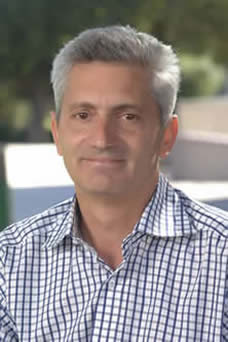News & Events > Department News > Lytle Lecture Series
Dr. Stephen P. Boyd
The Dean Lytle Electrical Engineering Endowed Lecture Series
Host: EE Professor Maryam Fazel
Co-host: EE Professor Jenq-Neng Hwang, Chair, Lytle Endowed Lectureship Committee
Read the UW Today press release
The Science of Better: Embedded Optimization in Smart Systems
 For General Audience
For General Audience
Monday, October 28th, 2013, 3:30-4:30pm
The Paul G. Allen Center - Microsoft Atrium
Map and Directions
Abstract
Many current products and systems employ sophisticated mathematical algorithms to automatically make complex decisions, or take action, in real-time. Examples include recommendation engines, search engines, spam filters, on-line advertising systems, fraud detection systems, automated trading engines, revenue management systems, supply chain systems, electricity generator scheduling, flight management systems, and advanced engine controls. I'll cover the basic ideas behind these and other applications, emphasizing the central role of mathematical optimization and the associated areas of machine learning and automatic control. The talk will be nontechnical, but the focus will be on understanding the central issues that come up across many applications, such as the development or learning of mathematical models, the role of uncertainty, the idea of feedback or recourse, and computational complexity.
Convex Optimization: From Embedded Real-Time to Large-Scale Distributed
[Watch the video] [View the slides]
Technical Colloquium
Tuesday, October 29th, 2013, 3:30-4:20pm
Electrical Engineering Building, Room 105
Map and Directions
Abstract
Convex optimization has emerged as a useful tool for applications that include data analysis and model fitting, resource allocation, engineering design, network design and optimization, finance, and control and signal processing. After an overview, the talk will focus on two extremes: real-time embedded convex optimization, and distributed convex optimization. Code generation can be used to generate extremely efficient and reliable solvers for small problems, that can execute in milliseconds or microseconds, and are ideal for embedding in real-time systems. At the other extreme, we describe methods for large-scale distributed optimization, which coordinate many solvers to solve enormous problems.
Biography
Stephen Boyd is the Samsung Professor of Engineering, and Professor of Electrical Engineering in the Information Systems Laboratory at Stanford University, with courtesy appointments in the department of Computer Science and the department of Management Science and Engineering. He received the A.B. degree in Mathematics from Harvard University in 1980, and the Ph.D. in Electrical Engineering and Computer Science from the University of California, Berkeley, in 1985, and then joined the faculty at Stanford. His current research focus is on convex optimization applications in control, signal processing, and circuit design.
Professor Boyd is the author of many research articles and three books: Convex Optimization (with Lieven Vandenberghe, 2004), Linear Matrix Inequalities in System and Control Theory (with L. El Ghaoui, E. Feron, and V. Balakrishnan, 1994), and Linear Controller Design: Limits of Performance (with Craig Barratt, 1991). His group has produced several open source tools, including CVX (with Michael Grant), a widely used parser-solver for convex optimization.
Professor Boyd has received many awards and honors for his research in control systems engineering and optimization, including an ONR Young Investigator Award, a Presidential Young Investigator Award, and the AACC Donald P. Eckman Award, given annually for the greatest contribution to the field of control engineering by someone under the age of 35. In 2013, he received the IEEE Control Systems Award, given for outstanding contributions to control systems engineering, science, or technology. In 2012, Michael Grant and he were given the Mathematical Optimization Society's Beale-Orchard-Hays Award, given every three years for excellence in computational mathematical programming. He is a Fellow of the IEEE, and a Distinguished Lecturer of the IEEE Control Systems Society. He has been invited to deliver more than 60 plenary and keynote lectures at major conferences in control, optimization, and machine learning.





